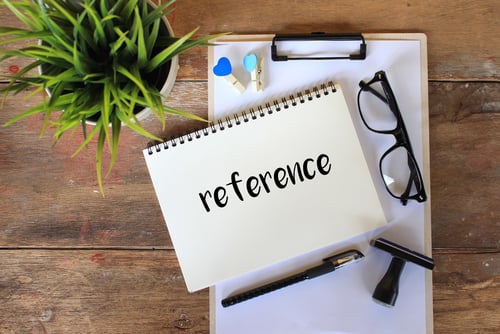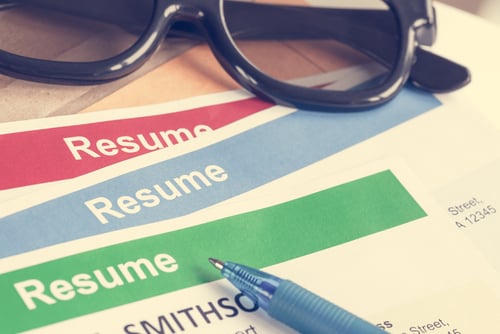Including references in a CV is a crucial step in the job application process. Not only do references provide potential employers with an idea of your past work experience and skills, but they can also serve as a valuable source of information and endorsement.
So, knowing when and how to include references in your CV is essential to make the most of this opportunity.
This blog post will cover the basics of CV references, including when and how to include them in your CV, what to consider when choosing references, and how to format and present them in your CV correctly.
Related Articles:
Soft Skills: What are They, and Why are They Important?-Drjobpro.com
12 Tips for Your Perfect LinkedIn Profile Photo-Drjobpro.com
By the end of this post, you should understand how to include references in your CV effectively and maximize their impact on your job search.
What are CV references, and how do they benefit job applicants?

CV references indicate an applicant's work experience, skills, and qualifications. Often, former managers, supervisors, colleagues, or clients can provide firsthand authorization of an applicant's abilities and work ethic.
In a job application, CV references provide potential employers with an outside perspective on the applicant and can help validate his skills and experience. As such, including CV references in a CV can be a valuable asset for job seekers.
If you include references in your CV, recruiters will contact them to learn more about you. They may ask about your relationship to the reference, their assessment of your work and personal qualities, and whether they believe you would be a good fit for the job you are applying for. This information can help recruiters gain a complete picture of your qualifications and suitability for the position.
Choose the Right CV References: 4 Steps

When choosing references for your CV, it's important to select individuals who can speak to your work experience, skills, and qualifications in a positive light. Here are some tips for choosing the proper references for your CV:
- Choose references who can speak to your relevant experience and skills: Your references should be able to provide detailed information about your work experience and qualifications that are relevant to the job you are applying for. This could include former supervisors, colleagues, or clients who know your abilities and work ethic firsthand.
- Choose references who have a positive impression of you: It's essential to select references who speak highly of your work and personal qualities. Avoid choosing references who may have had negative experiences with you or who may not have a favorable opinion of you.
- Choose a mix of professional and personal references: In addition to professional references, it can be beneficial to include personal references who speak to your character and qualities. These could be friends, family members, or community leaders who know you well and can provide a well-rounded assessment of your abilities and potential.
- Obtain permission from your references before including them: Before including a reference in your CV, it's essential to obtain their permission and contact information. This will ensure that they are willing and able to provide a reference for you if contacted by a potential employer.
By following these tips, you can choose the correct references for your CV and increase your chances of making a positive impression on potential employers.
Is It a Must to Add References to My CV?
It's not always necessary to include references on a CV. In some cases, it may even be counterproductive to do so. This will discuss when it is appropriate to include references on a CV and when it is best to leave them out.
When Should I Include a List of References on My CV?
References should be included on your CV when:
Your future employer has requested it. In some situations, references, your CV, and a cover letter are mandatory components of your application.
It will be beneficial to the employer. If you have recommendations, it will make the recruiter's task more manageable.
The reference recognizes you. If you have gotten any awards or raises for your good work in the past, this is an excellent time to emphasize your accomplishments.
You want to make a good impression on your boss. If you have a well-known, reputable reference, or prominent status at your prior company or school, their remarks may be more persuasive to recruiters. Make sure the reference recognizes you entirely and can provide valuable information regarding you when asked.
You want to boost the credibility of your CV. Your credibility may enhance if recruiters see that you provided references on your resume. It makes you look more honest since it demonstrates you have nothing to conceal and makes you appear more dependable because your past employers must have wonderful things to say about you.
There is still space on your CV. This is particularly true if you recently graduated or are otherwise new to the job market. Fill in any space at the bottom of your CV to give the impression that it is more complete.
When to Not Include References in My CV?
There are some situations where you may not want to include references on your CV. For instance, if you are applying for a job and the employer has not explicitly requested references, it may be best to leave them off your CV. Additionally, if you do not have relevant references who can speak to your skills and experience, it may be best to omit them from your CV. Finally, if you do not have the permission of the individuals you would like to list as references, it is best not to include them on your CV.
How Do I Include References in My Curriculum Vitae?
To include references in your CV, you should create a separate section at the end that is specifically dedicated to listing your references. This section should be titled "References" or "Professional References" and include the names, job titles, organizations, phone numbers, and email addresses of the individuals you list as references. It is essential to ensure that you have the permission of the individuals you list as references and that they know that potential employers may contact them. Additionally, you should provide enough information about each reference so potential employers can easily contact them.
Reference template
Reference's full name
Job title
Company name
Work address
Work phone number, extension code (if applicable)
Work email
Brief description of the reference's relationship with you
Examples of CV References

Here are some examples of how you can format your references section on your CV:
CV Reference Example 1:
John Doe
Manager – ABC Company.
Dubai, UAE 45216
444-444-4444
Relationship: Direct manager at a previous job.
CV Reference Example 2:
Chris John
Head of Talent Acquisition – XYZ Company.
Dammam, KSA 65488
555-555-5555
Relationship: Head of Talent Acquisition at current company
Incorrect CV Reference Examples
Here are some examples of an incorrect way to include references on your CV:
Incorrect CV Reference Example 1:
Jane Smith, Director at ABC Corporation
Phone: 444-444-4444
It is essential to ensure that you provide complete and accurate information for each reference you include on your CV. In this example, the reference for Jane Smith is incomplete because it does not include her email address. This can make it difficult for potential employers to contact her, which can be problematic.
Incorrect CV Reference Example 2:
Deo Chris
Sales Specialist
ABC Retail Group
5642 Karma St.
Dubai, UAE
555-6699-6555
Relationship: Schoolmate
In this example, the formatting of the reference section may look good at first glance. Still, the individuals listed as references do not have a professional or academic relationship with the applicant, which makes them inappropriate choices for CV references.
CV References- Conclusion
Including a list of references on your CV is generally a good idea. This can help to provide potential employers with additional information about your qualifications and work experience.
Typically, a list of references should be included towards the end of your CV, after your work experience and education sections. It is essential to ensure that you have the permission of the individuals you list as references and that they know that potential employers may contact them.
It is also a good idea to provide their contact information, including their name, job title, organization, phone number, and email address.








 2025-10-20
2025-10-20
 2025-08-14
2025-08-14
 2025-08-08
2025-08-08
 2025-08-06
2025-08-06
 2025-08-05
2025-08-05